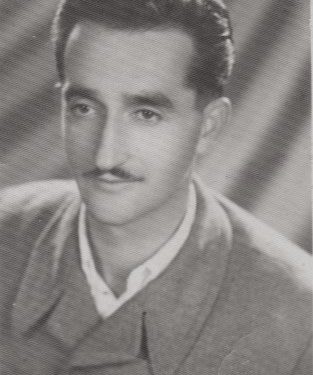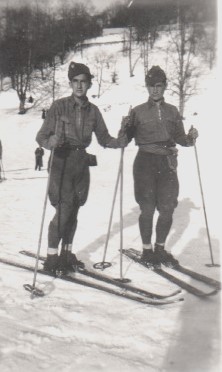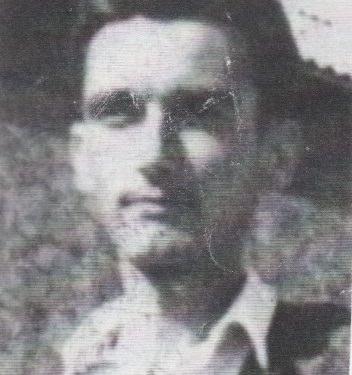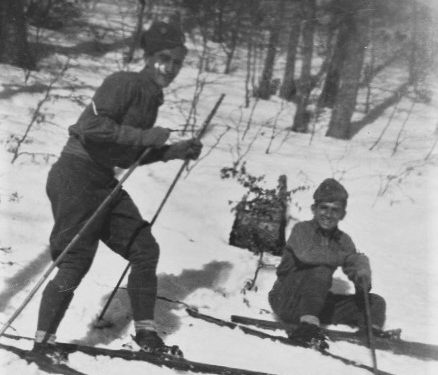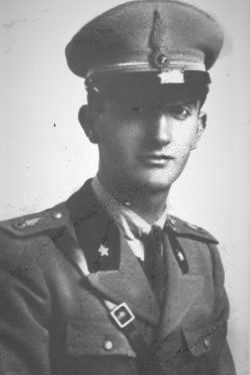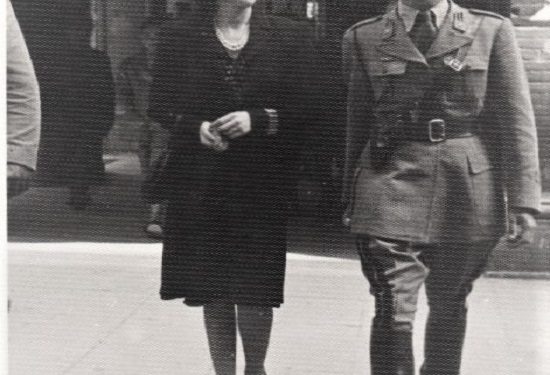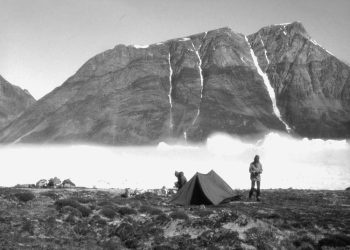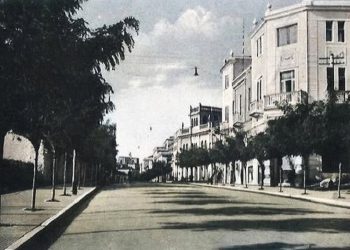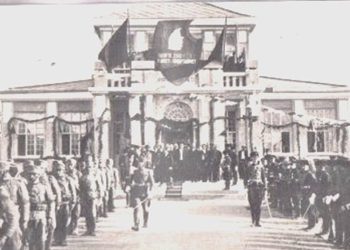By Lek Pervizi
Part five
THE ODYSSEY OF INNOCENCE
To my brother Valentin, who faced
47 years of the ideological storms of
communism, moreover, separated
from his wife, a true Odyssey
in the middle of the twentieth century.
Memorie.al / When you enter Skuraj and cross the Urdhaza stream, the mountain ascent begins, through the hill called of Lekbibaj. You pass three mills in a row, known as those of Gjin Pjetri, which are built one after the other. You also pass the two-story tower of Ndrec Pjetri, Gjin’s younger brother, and then, you encounter a rocky outcrop on which a complex of three stone buildings is built, the historic towers known as the towers of Gjin Pjetër Pervizi of Skuraj, the leader of the Kurbin uprising. These buildings dominate the entire valley, which is formed by the union of the Mat and Fan rivers (a branch of the Mat), up to Milot. Almost a fortress, which protects and defends the area from the expeditions of foreign invading armies, which could penetrate from that gorge, until they hit the wall of the Skuraj Mountains, where the towers we mentioned were built.
Aerial Bombings
In Bologna, Valentin stayed sheltered with his fiancée’s family, living illegally and constantly in danger of being arrested. During this time, the Allied forces that had landed in Sicily faced strong resistance from the German troops, and had to conquer every inch of territory held by the enemy. With this new war front, which engulfed Italy for two years, the Italians found themselves facing the bitter reality of a war that dragged on across their land. For them, the worst was just beginning. The bombings intensified, and all you could see were suffering and misery, shortages and disorder of all kinds, death and tragedy.
Valentini went out very rarely, only when there was an essential need. Twice he was at risk of being arrested. One day, when he entered a store to buy a pack of cigarettes, two militiamen approached him. They looked at his face and, seeing that he was of the age required to be recalled for military service, as stated on the numerous posters that filled the walls and windows of establishments, and since he didn’t have any identification documents, they took him to a dead-end alley. There, hundreds of young men were gathered, guarded by fascist Blackshirt agents armed to the teeth.
Some watched from the surrounding windows with their weapons aimed at the crowd, which included Valentin. Fortunately, before they put him in with the others, from where it would have been difficult to get out, a captain he knew, a school friend, who had agreed to cooperate with Mussolini’s fascist militia, passed by.
When he saw Valentin, he immediately intervened and freed him. Another time, the police had blocked the streets to arrest some suspicious people, but they had forgotten to guard the church, where Valentin entered and exited through a second door on the other side of the street. With the fall of Mussolini in July, the Italians had thought that the worst was over and that better days would come, while that event was bringing chaos, anarchy, and destruction.
In those conditions, Valentin and Gori decided to get officially married. The marriage took place both at the municipality and in the neighborhood church. This decision was made by the two young people, considering the great dangers that came from the daily bombings, which caused destruction and death. At least, if their fate was to end up under the rubble of the bombs, they would die as husband and wife.
Valentini writes in his notes that the bombings followed one another, and that two or three times, he himself had been in danger of being killed, and had barely escaped. One time he heard the loud noise of the “flying fortress” squadrons, he tried to enter a shelter near the station, but changed his mind and ran to a large building, where people were entering, because the alarm signal had been given by the sirens. But, since there were many people, he ran further and entered the first shelter he found, just as the bombing began. The bombing was very heavy and came in three waves. When the sirens sounded for the danger to pass, and those who were sheltered came out, what did they see…?!
Exactly in the building where he wanted to enter, which had a shelter that extended to the street, and was considered the safest shelter, a one-ton bomb had fallen there, which had pierced the road and the concrete, wreaking havoc on the poor people who had taken shelter. Valentini said, what did I see…?! Pieces of arms and hands, legs and skulls. He said that a delicate arm of a girl, with her wristwatch on her wrist, was thrown by the blast of the explosion onto the asphalt of the road, far from the blast. Horrible…!
But he would face the greatest danger at the house where he lived with his wife’s family. It was night and the people had gone to sleep. When, suddenly, the sirens sounded and everyone rushed down the stairs to take shelter in the basements. The bombing continued for a long time and they felt the great tremors caused by the bombs that were falling nearby. When the sirens sounded for the danger to pass, and they started to go out, they found themselves blocked. The surrounding buildings had collapsed and had blocked their shelter. They were in danger of dying of asphyxiation from the lack of air. They all lay on the ground, exhausted. Valentin had been able to endure more, while his wife was now resting in his arms, and could barely breathe.
His mother-in-law was lying on the ground as if dead. So were other people. Dramatic moments! Powerless to do anything, they just waited, hoping someone would come to help them. And then, by their luck, the noise of drills was heard, and after a while, the whistling of air that began to enter through a hole that the workers had opened. This made Valentin think.
In this state of war that had no end in sight, would it not be better to return to Albania, where he had been told that a national government had been created, and that there was apparently peace? A school friend of his, whom he had met by chance, had told him, what was he doing there? His father was the Minister of Defense. They had their property and houses there. He himself would leave as soon as possible, but he had to go to Turin, where his wife was.
One-Way Journey
In addition to the bombings, he was at risk of being caught by the Germans or fascists. After a few days, another friend, Nuri Nuçi, came and met him, who was leaving for Albania with his wife. He also spoke to him like the first one. Valentin made up his mind, but what about the documents? In cooperation with Nuri, who knew a person who dealt with forgeries, they were provided with passports as students, with different names from the ones they had. They were given the right by the German command itself and received regular visas. Nuri had also married an Italian woman, whom he would take with him. So it was decided. In fact, Valentin wanted to convince Gori not to leave with him, but to wait for him in Bologna, where he would come to pick her up as soon as the war was over. Gori refused, and so they decided to take the trip to Albania, together. They left in August 1944.
On their journey, they stopped in Verona, where Gori had a married sister, with the director of the Mondadori branch. The husband and wife tried to convince them not to go to Albania. Even to stay with them, as long as they wanted, until that cursed war ended. But no! Their fate was already sealed. You cannot escape fate. They parted from their friends, with great sadness.
As if their hearts felt that they would never see each other again. They boarded the train and arrived in Vienna, where they had to report to the police. They were received by a German officer, to whom they said that they had continued their studies at the University of Naples, but could not go, because the Allied troops were there. Therefore, it was better for them to return to their country, to Albania.
“Okay,” the officer told them, “but until the day of departure, you are obliged to report every day. And you can only leave when we get the authorization. Meanwhile, they began to get information about the situation in Albania, from Albanians who had left from there, because in Italy, they had not had any opportunity to hear anything, where neither radio nor the press gave news about Albania.
After two weeks, they learned that some Albanians had arrived there. The Albanians they met told them that the situation there was as bad as it could be. It was not enough to fight against the occupier, but the war had begun between the political opponents, that is, the civil war, caused by the communists, to seize power, where they had begun to commit crimes.
From what they heard, they decided to return, and therefore went to the Italian Consulate, where they were told that without the authorization of the German police, they could not return to Italy. They went to the Police and met the same first officer, hoping that he would allow them to return to Italy. The officer received them with an ironic smirk:
“Since you do not want to continue the journey you started, you are obliged to implement the laws in force of our state. Therefore, you will work where the local authorities assign you. There are no jobs in the city, so all four of you, as you are, must go to work in our factories on the outskirts of the city, where you will be paid well every Saturday. Tomorrow morning, I expect the final answer.” According to the information they received, the factories were constantly being bombed by the American air force. The next day they went and told that police officer that they did not need to work, because they had a living. He replied bluntly:
“At this moment you must choose, either to continue the journey to Albania, or, on the contrary, within three days, I want to see you registered in the factories where you will be assigned. There is no other solution.”
If they had been without their wives, they would have agreed to work in those factories, and to spend the days, to find a way to return to Italy, even in secret forms and by any means, even on foot. The news they had received about Albania was very bad. But there was no other solution. So they were forced to submit to the situation and inform that officer that, from what they understood, they preferred to continue the journey.
The officer added that they had to wait for the “Passage Permit” that had to come from who knows where. That “passage permit” came after two months, during which they had to sell some of their wives’ valuables to get by in that beautiful and magnificent city. But it was not hospitable to them. To make matters worse, Valentin had no knowledge of his father’s friends, no address, no names.
Who would have definitely helped him, as they were in high positions? One of them, even a field marshal. But who was it?! They left. They took the train to Zagreb. The city was quite beautiful and was divided into the old city and the new city. The latter had many Viennese-style buildings, and even the theater was a copy of the Vienna “Opera” theater. They did not notice any signs of destruction, as they were used to seeing in Italy, because Zagreb had not known war, but it looked like an abandoned city, because there was little circulation of people.
They could not continue to Belgrade, because the train bridges were destroyed by American aviation. Therefore, the next day, they returned to Vienna, from where they left for Budapest, where the train stopped and then left in the direction of a railway junction in the north of Yugoslavia, for Esseg, and from there, to Belgrade. In Esseg they were forced to get off, because there was an air raid warning, but the majority of the military personnel stayed on the train. The planes flew over the area to go and hit other targets. So after a while they left again, and arrived in Belgrade. Belgrade was in ruins.
There was no electricity, no water, no gas, no anything. During the three days they stayed there, they met several Italians who advised them not to go to Albania, because it was worse there than in Yugoslavia. Belgrade had been destroyed by the German air force bombing on the first days of the occupation. All those destructions had been caused in a single night. According to the residents, over 27,000 people had lost their lives that night. Horrible. Surprisingly, the only skyscraper in the city, of 20 stories, had remained standing, untouched. The city was completely empty. A passerby was rarely seen.
Completely contrary to the advice of the Italians, after three days of staying among the ruins of Belgrade, the two couples left for Skopje, with the intention of crossing into Greece and arriving in Athens. The plan was well thought out, but fate would decide otherwise. After 40 km, they had to get off, because the railway bridge over the river was destroyed by the bombings. They had to cross the river on foot and arrive at the city of Kralievo. Later they would remember that they had made a mistake. They should have returned with the train to Skopje, where they could have stayed and found a way to cross into Greece. But in that situation, it was as if their minds were blocked. And they didn’t give much importance to the situation in Albania. After all, they would be dealing with Albanians.
Even more so since they came almost as foreigners, from their long stay in Italy for studies. Then as academy officers, they were able to serve the homeland. The Albanian communists would have shown some manliness and taken their training into account. Since they were stuck on the road, all four of them, they thought of going to the city center. They found it completely empty. They entered a very large bar, filled with chairs and tables. They decided to spend the night there, putting the tables together and keeping their suitcases very close. They had been told that in that region, the fratricidal war was fierce between the two political sides, communists and nationalists. So much so that when the German units passed by, no one bothered them.
That night they couldn’t sleep, for fear that someone would come to steal from them. The next day they went out onto the main road, hoping that some German vehicle would pass. The residents had told them that precisely in that period, German military vehicle often passed by. They waited there for a long time, until a German column arrived and stopped. The trucks were almost empty and with little personnel. As it seemed and as people said, they were going to get troops and materials in Albania. Everyone already knew that the Germans were retreating, albeit very slowly. Another thing was that the German vehicles were not going to Greece, which would have been a favorable solution for them, to cross into Italy. It was as if they were truly in the hands of fate, which guided them, or rather; forced them to act against their will.
Valentin and Nuri appeared before the commander with the rank of colonel, to whom they told that they wanted to go to Albania. He hadn’t said anything, but had pointed with his finger to a vehicle, where they were placed. After an hour, the convoy had left. Until then, with the exception of two cases of air raid warnings, on Hungarian soil, where they were forced to get off and scatter among the bushes and thorns, and then get back on the train, they had not experienced any danger from any air attack. This time, after two hours of travel, towards the evening, a white fighter plane, certainly English appeared behind a hill. The column stopped and everyone got off, looking for a place to hide.
When the fighter started to machine-gun, Valentin and Gori hid behind the trunk of a tree. They heard the whistling of the bullets passing near them, rising dust and pieces of earth around them. The plane passed to the other side to return, and the couple also passed to the other side of the trunk. The Germans responded with their machine guns and rifles. This time the bullets passed closer and one had pierced Gori’s astrakhan fur coat, but she had not realized it. The fighter passed by two more times, and then disappeared. About four or five vehicles were damaged, one had caught fire, and two soldiers were wounded, but not seriously.
It didn’t take long and the convoy left. Only after an hour, Gori saw the hole in her astrakhan fur coat, which was proof of the danger they had gone through. They traveled all night, but with fear that they would be attacked by some group of partisans, who were operating in those parts.
Finally they arrived in Prizren. Here they learned many things, but they had no other way to return. Meanwhile, Valentin met some people from Prizren who had heard about his father, when he had been in Kosovo, for the organization of the army and the Kosovar volunteer forces, in defense of the northern borders of the ethnic state, created after the occupation of Yugoslavia by the Germans. They spoke with admiration and appreciation for the general, as they called him, and helped the four travelers, for the two days they had to stay there. They were lucky to get on another German truck and after two days of travel with stops and obstacles, they arrived in Shkodër. Memorie.al




